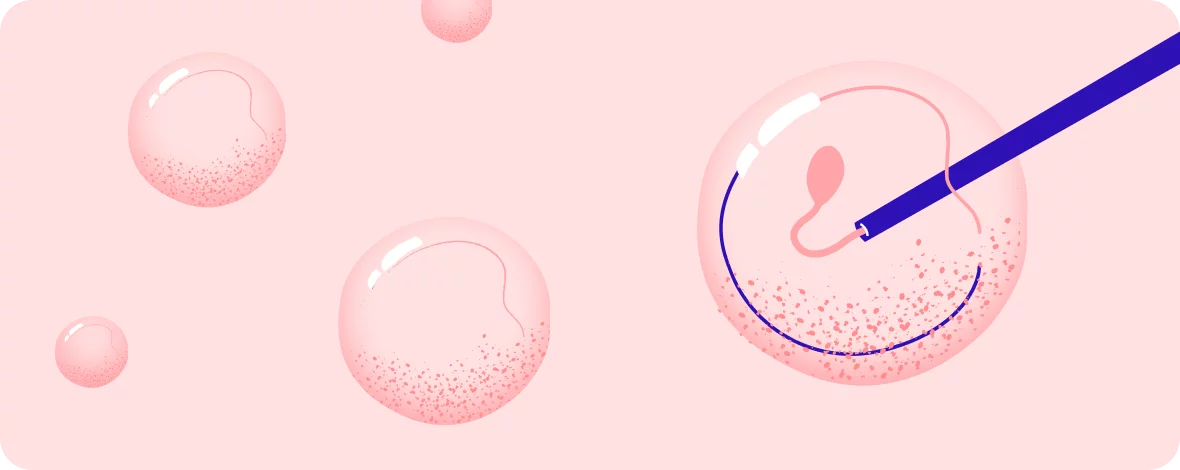Používáte nepodporovaný, zastaralý internetový prohlížeč. Stránky v něm nemusí být správně zobrazeny, mohou být pomalé a nemusí správně fungovat. Zaktualizujte si prohlížeč nebo si nainstalujte nový. Doporučujeme použití některého z následujících prohlížečů: Google Chrome, Edge, Mozilla Firefox


Repeat attempt at fertilisation
IVF is not always successful on the first try. Or even on the second. This is a relatively common occurrence, so don’t lose hope. Our team of assisted reproduction specialists will advise you how to increase your chances of a successful pregnancy and they’ll be by your side throughout the treatment, until your pregnancy is confirmed.
Contact usCryo-embryo transfer
In cryo-embryo transfer (CET), embryos retrieved in previous IVF cycles and safely stored in a frozen state are transferred to the uterus. Thanks to CET, we can significantly reduce the cost of IVF treatment.
Methods that increase the chances of pregnancy
See how you can increase your chances that everything will work out this time. We will recommend the right methods for following an initial consultation with a doctor.
KIR genes and HLA-C testing
KIR and HLA-C testing helps to reveal whether the embryo's surface antigens can activate the cells responsible for the proper implantation process in the uterus.
More informationSanakin®
Sanakin® (ACRS – Autologous Conditioned Serum Rich in Cytokines) is a modern laboratory method that uses the patient's own blood.
More informationICSI
ICSI is the injection of sperm directly into an egg. This significantly increases the chance of fertilisation.
More informationEmbryoScope
We can increase the chances of pregnancy by selecting only the best quality embryos for transfer. We can identify these through continuous monitoring in EmbryoScope.
More informationPESA/MESA/TESE
In the absence of live sperm in the ejaculate, there is the possibility of obtaining sperm surgically from the epididymis (PESA or MESA) or testis (TESE).
More information All methodsHow to proceed in case of a repeated attempt
It’s important to consult your doctor on what you should do next, or our coordinators will be happy to advise you. If your attempt is unsuccessful, you need to stop taking the prescribed medication and contact us during your next menstrual cycle to schedule another attempt. If you have undergone an unsuccessful attempt at another centre, we will help you arrange a transfer to our fertility clinic.
Free initial consultation
Or call our coordinator

Jelena Vujović
Coordinator for English speaking clientsThank you for your interest in the services of Europe IVF clinic.
Your form has been successfully submitted.
We will get back to you as soon as possible.
True stories
Simona
I had an good experience at Europe IVF clinic in Prague and I highly recommend. A huge thank you to Giorgiana, the romanian coordinator, who guided me through every step of this process. Giorgiana was incredibly responsive, patient, and compassionate, answering all my questions and offering advice any time needed.
The clinic is modern, clean, and welcoming, with a calm and professional atmosphere. The staff were always friendly, and the medical team was highly skilled, explaining every procedure and ensuring I was comfortable and informed at all times.
Thanks to the expertise and care at Europe IVF, I am now expecting, and I couldn't be more grateful for the support I received from Giorgiana and the entire medical team.
If you’re looking for a fertility clinic in Prague, I would highly recommend Europe IVF. Their combination of advanced technology, excellent medical care, and personalized attention made all the difference in my journey.
Dan D.
Everything went perfectly! We would like to thank to the doctors and to Manuela, that helped us in a very friendly matter. She was very responsive to our questions, even during her free time. We would highly recommend this clinic for future couples that would like to obtain a pregnancy. We got results on the second try, so don't give up after the first one. There is a very big chance that the second time will be a success.
Recomandam clinica, tuturor cuplurilor ce trec prin aceeasi situatie prin care am trecut noi, pentru ca in final, a meritat tot efortul!
Katerina – Kiril
22. 5. 2023 - Europe Ivf team THE BEST OF THE BEST!! Thank you for the great experience and making the whole process smooth and easy for us!! I recommend to everyone who struggles to conceive to contact Europe Ivf, the whole team IS GREAT!! Especially i want to thank to our coordinator Alexandra for being there for us and helping us to get through the process and answering all our questions in timely manner!! Big thank you to Dr Tomilova for the professionalism and knowledge.

Frequently asked questions
-
How long before I can repeat IVF?
The interval between IVF cycles depends on the type of treatment and the intensity of hormonal stimulation. We usually recommend a break of 2 to 3 months.
-
Why should I choose your clinic?
- We have hundreds of satisfied clients from the Czech Republic and many other countries.
- We offer top quality treatment at prices comparable to other clinics in Prague.
- We have no hidden fees.
- We have a proven track record, with a success rate up to 68%, which ranks us among the world’s leading centres of assisted reproduction.
- We will book you for IVF treatment immediately without waiting.
- Our clinic uses the most modern technology currently available in the world.
- Our experienced staff and doctors speak English and German.
- We approach each client individually.
- We will help you with all the formalities.
- We offer initial consultation with a doctor by phone or skype free of charge.
- We also offer genetic and immunological testing to help determine the cause of infertility.
-
How does age affect fertility?
Age is crucial for a woman’s fertility. A woman starts to be less fertile after the age of 30 and fertility decreases very quickly from the age of 35. One of the reasons is that the quality of eggs decreases. This can be solved by using donated eggs.





